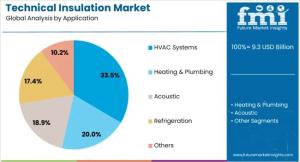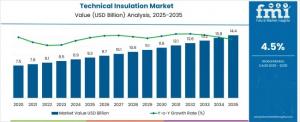Technical Insulation Market to Hit USD 14.4 Billion by 2035, Fueled by Energy Efficiency & Industrial Growth
Rigid Foam will dominate with a 36.8% market share, while HVAC systems will lead the application segment with a 33.5% share.
NEWARK, DE, UNITED STATES, November 7, 2025 /EINPresswire.com/ -- The Technical Insulation Market is on a growth trajectory, set to rise from USD 9.3 billion in 2025 to USD 14.4 billion by 2035, expanding at a compound annual growth rate (CAGR) of 4.5%, according to recent industry forecasts. This momentum is fueled by mounting global demand for energy efficiency, process safety, and sustainable infrastructure—particularly across the Asia-Pacific (APAC), Europe, USA, and Saudi Arabia industrial and construction sectors.
Technical insulation plays a pivotal role in minimizing heat loss, enhancing acoustic control, and ensuring operational reliability in industries ranging from oil and gas to power generation, HVAC, and commercial real estate. As industries accelerate their decarbonization efforts, the adoption of advanced insulation materials—such as mineral wool, glass wool, rigid foam, and elastomeric foams—is reshaping market dynamics across global economies.
Energy Efficiency Regulations and Green Infrastructure Drive Expansion
Energy efficiency mandates are emerging as a defining force in the technical insulation market. Governments across the EU, North America, and the Gulf Cooperation Council (GCC) are enforcing stringent thermal management and fire safety regulations. These initiatives are driving extensive adoption of insulation materials in industrial, commercial, and residential applications.
In the United States, retrofitting of aging industrial facilities and the expansion of LNG terminals are major demand drivers. Meanwhile, Europe’s decarbonization agenda and building retrofits under directives like EU’s Energy Efficiency Directive (EED) are propelling market growth in Germany, France, and the UK.
In Saudi Arabia, Vision 2030’s focus on industrial diversification and energy conservation has accelerated insulation use in oil & gas pipelines, refineries, and construction megaprojects. Across Asia-Pacific, rapid industrialization in China and India continues to push large-scale adoption in power generation, steel, and chemical processing sectors, making the region the fastest-growing market globally.
Review the full report to examine in-depth market dynamics, strategic developments, and growth opportunities across key regions! Request Sample Report: https://www.futuremarketinsights.com/reports/sample/rep-gb-24791
Segmental Insights
Rigid Foam Leads Product Segment with 36.8% Share
Rigid foam dominates the market due to its superior thermal resistance, moisture control, and lightweight structure, ideal for high-performance HVAC and process applications. Its compatibility with prefabricated panels and retrofit projects has made it the preferred material for energy-efficient infrastructure.
HVAC Systems Command 33.5% Market Share
The HVAC application segment is projected to hold one-third of the market share by 2025. With global urbanization and the rise of smart buildings, insulation within HVAC systems ensures energy conservation, acoustic comfort, and regulatory compliance, particularly in commercial and industrial facilities.
Commercial Buildings Retain 29.4% End-Use Share
Commercial real estate, including data centers, offices, and hospitality projects, is a key consumer segment. The growing emphasis on indoor air quality, energy efficiency, and noise reduction—alongside certifications like LEED and BREEAM—is driving adoption of advanced insulation materials.
Regional Market Performance
Asia-Pacific: Industrialization Fuels Demand
- China: CAGR of 6.1%, driven by power plant and refinery insulation upgrades.
- India: CAGR of 5.6%, led by steel, energy, and commercial construction growth.
- Key drivers: Urban infrastructure expansion, industrial modernization, and HVAC penetration.
Europe: Sustainability and Retrofits Lead
- Germany: CAGR 5.2%, propelled by EU efficiency directives and industrial retrofits.
- France & UK: Focused on building refurbishments and fire safety standards.
- European firms are innovating with aerogels and microporous insulation systems.
United States: Industrial Refurbishment & Energy Security
- CAGR 3.8%, supported by oil & gas, manufacturing, and commercial retrofits.
- Acoustic insulation in real estate and energy conservation regulations reinforce growth.
Saudi Arabia: Vision 2030 and Energy Projects Boost Adoption
- Rising use in oil & gas processing facilities and power generation plants.
- Expansion of smart cities and industrial zones under Vision 2030 strengthens long-term demand.
Innovation in Material Science Shapes the Future
Emerging technologies such as aerogels, microporous composites, and smart thermal barriers are redefining insulation performance. These materials offer lighter, safer, and more efficient alternatives suitable for both high-temperature industrial systems and modern architectural designs.
Digitalization is also transforming the market. IoT-enabled monitoring systems are being integrated into insulation layers, enabling predictive maintenance and real-time energy optimization—a major trend across APAC and Europe’s smart infrastructure initiatives.
Acquire the complete report to access detailed projections, country-level insights, company share assessments, and technology outlooks! Buy Full Report: https://www.futuremarketinsights.com/checkout/24791
Challenges and Opportunities
Despite strong growth prospects, installation complexity and upfront costs remain hurdles, particularly for smaller industrial operators. However, the long-term energy savings, regulatory compliance, and sustainability benefits continue to justify investment in premium insulation systems.
Rising raw material prices, especially for glass fibers and elastomers, pose cost challenges. To counter this, manufacturers are focusing on regional supply chains and recyclable materials, aligning with circular economy goals.
Competitive Landscape
The global market remains moderately consolidated, with key players including:
Armacell, Rockwool International A/S, Saint-Gobain, Knauf Insulation, Owens Corning, Kingspan Group, Johns Manville, BASF SE, L’Isolante K-Flex, Kaimann GmbH, Huntsman Corporation, and Paroc Group.
These companies are investing in R&D for low-carbon insulation materials, expanding manufacturing bases in APAC, and forming strategic partnerships to meet region-specific energy efficiency mandates.
Exploring Insights Across Emerging Global Markets:
Surface Disinfectant Chemicals Market: https://www.futuremarketinsights.com/reports/surface-disinfectant-chemicals-market
Chitin Market: https://www.futuremarketinsights.com/reports/chitin-market
Precious Metal Plating Chemicals Market: https://www.futuremarketinsights.com/reports/precious-metal-plating-chemicals-market
Rust Remover Market: https://www.futuremarketinsights.com/reports/rust-remover-market
About Future Market Insights (FMI)
Future Market Insights, Inc. (FMI) is an ESOMAR-certified, ISO 9001:2015 market research and consulting organization, trusted by Fortune 500 clients and global enterprises. With operations in the U.S., UK, India, and Dubai, FMI provides data-backed insights and strategic intelligence across 30+ industries and 1200 markets worldwide.
Why Choose FMI: Empowering Decisions that Drive Real-World Outcomes: https://www.futuremarketinsights.com/why-fmi
Sudip Saha
Future Market Insights Inc.
+18455795705 ext.
email us here
Visit us on social media:
Other
Legal Disclaimer:
EIN Presswire provides this news content "as is" without warranty of any kind. We do not accept any responsibility or liability for the accuracy, content, images, videos, licenses, completeness, legality, or reliability of the information contained in this article. If you have any complaints or copyright issues related to this article, kindly contact the author above.


